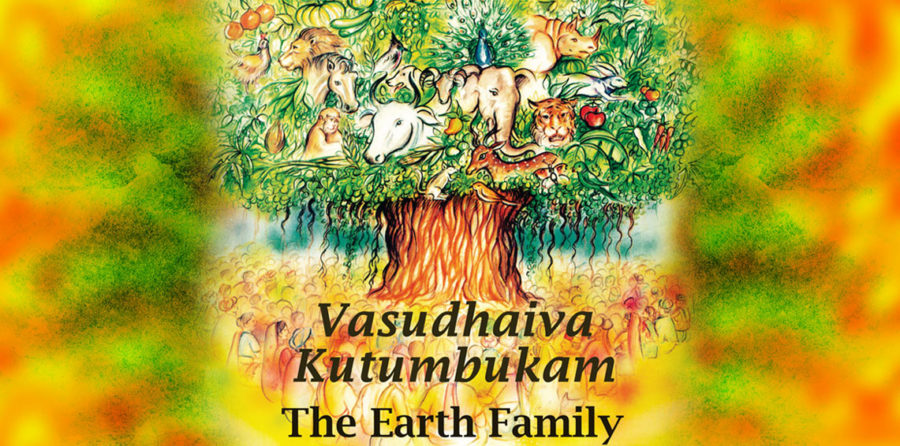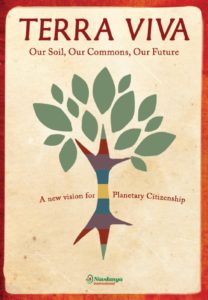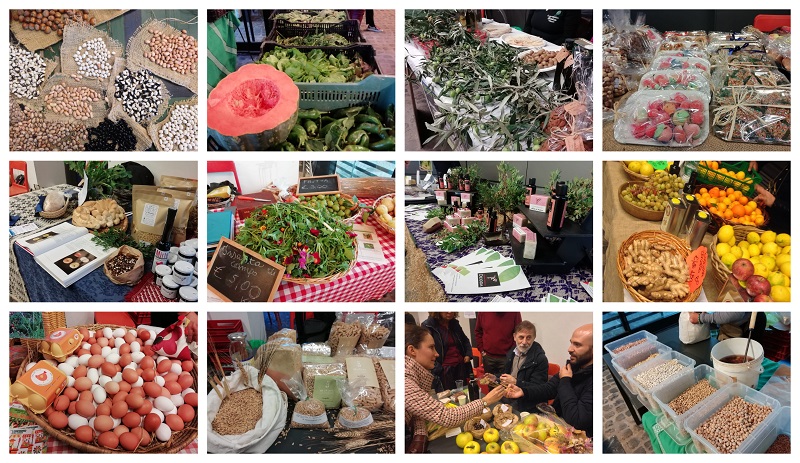
Globalization and corporate capitalism see the world where the planet is a deposit of limitless resources to be exploited for the creation of wealth. The expansion of a global market-based economy has been done at the expense of nature’s economy and a sustenance economy where corporations have systematically enclosed the commons. Those resources that are managed and used by all members of communities, that have sustained people and cultures for centuries, are now becoming privatized and commoditized by corporations seeking only to maximize potential profits. Unfettered competition and profits are the engine of corporate globalization, while the people bear the brunt of the externalities created by short-sighted, greed-based projects.
We are living in a linear, economy-driven world that is inevitably unsustainable. Like colonialization before it, corporate globalization counts on claiming resources outside of the scope of ownership and inside the trust of the commons of people. Through the efforts of the WTO and agribusiness giants, subsistence and small farmers have lost the right to food through the increasing expansion of business-based agricultural methods that benefit the corporations, at the expense of labour and lead to rural despair and hunger in the world. Free trade, industrial agriculture, patents and intellectual property rights (IPRs) and the commodification of seed and food have produced an impoverished and toxic planet, ill health and disease, rampant inequality and dying democracies.
Unfair trade rules and pseudo-safety laws that dump junk food, fake food, GMOs, synthetic and artificial food on the countries’ markets are based on unjust and unscientific laws of extraction, exploitation, domination and corporate colonisation, mosty serving the interest of the global North.
The development of scientific knowledge has increasingly become privatized and commercialised. With the alliance between large private corporations and public agencies of scientific research, knowledge has been co-opted to serve private interests.
Earth Democracy is rooted in the ancient Indian concept of Vasudhaiva kutumkam, the earth family. As one family, all beings have equal rights to sustenance through the gifts of the earth. Its three components: economy, environment, and people, must be in balance to maintain sustainability. Navdanya is also part of the movement for the recognition of the Rights of Mother Earth: The Global Alliance for the Rights of Nature.
Through its Earth Democracy project, Navdanya International works to promote a shift towards a circular model where the economy is held in no greater esteem than the environment and the resources it provides and the people, for whom justice, fairness, and the right to resources is of equal importance. It’s a new vision for a Planetary Citizenship, an alternative worldview, rooted in caring and compassion for the Earth and Society, in which humans are embedded in the Earth Family, where ecological responsibility and economic justice, based on the Law of Return, are central to creating a liveable future for humanity.
Quotes from the book Earth Democracy: Justice, Sustainability, and Peace, by Dr Vandana Shiva:
“In nature’s economy the currency is not money, it is life.”
“Whenever we engage in consumption or production patterns which take more than we need, we are engaging in violence.”
“The fight for truth…is not just our right as free citizens of free societies. It is our duty as citizens of the earth.”
“We need to reinvent our eating and drinking, our moving and working, in our local ecosystems and local cultures. Enriching our lives by lowering our consumption, without impoverishing others. And above all, we need to subject the laws that govern production and consumption to the laws of Gaia; the laws of the planet.”
Principles of Earth Democracy
1. Ecological Democracy – Democracy of all life
We are all members of the Earth community. We all have the duty to protect the rights and welfare of all species and all people. No humans have the right to encroach on the ecological space of other species and other people, or treat them with cruelty and violence.
2. Intrinsic worth of all Species and Peoples
All species, humans and cultures have intrinsic worth. They are subjects, not objects of manipulation or ownership. No humans have the right to own other species, other people or the knowledge of other cultures through patents and other intellectual property rights.
3. Diversity in Nature and Culture
Defending biological and cultural diversity is a duty of all people. Diversity is an end in itself, a value, a source of richness both material and cultural.
4. Natural Rights to Sustenance
All members of the Earth Community including all humans have the right to sustenance — to food and water, to safe and clean habitat, to security of ecological space. These rights are natural rights, they are birthrights given by the fact of existence on earth and are best protected through community rights and commons. They are not given by states or corporations, nor can they be extinguished by state or corporate action. No state or corporation has the right to erode or undermine these natural rights or enclose the commons that sustain all through privatisation or monopoly control.
5. Earth Economy is based on Economic Democracy and Living Economy
Earth democracy is based on economic democracy. Economic systems in Earth Democracy protect ecosystems and their integrity, they protect people’s livelihoods and provide basic needs to all. In the earth economy there are no disposable or dispensable species or people. The earth economy is a living economy. It is based on sustainable, diverse, pluralistic systems that protect nature and people, are chosen by people, for the benefit of the common good.
6. Living Economies are built on Local Economies
Conservation of the earth’s resources and creation of sustainable and satisfying livelihoods is most caringly, creatively and efficiently and equitably achieved at the local level. Localization of economics is social and ecological imperative. Only goods and services that cannot be produced locally, using local resources, local knowledge should be produced non-locally and traded long distance. Earth democracy is based on vibrant, resilient local economies, which support national and global economies. The global economy does not crush and destroy local economies.
7. Living Democracy
Earth democracy is based on local living democracy with local communities, organised on principles of inclusion and diversity and ecological and social responsibility having the highest authority on decisions related to the environment and natural resources and to the sustenance and livelihoods of people. Authority is delegated to more distant levels of governance on the principle of subsidiarity. Earth democracy is living democracy.
8. Living Knowledge
Earth democracy is based on earth centered and community centered knowledge systems. Living knowledge is knowledge that maintains and renews living processes and contributes to health of the planet and people. It is also living knowledge in that it is embedded in nature and society, is not abstract, reductionist and anti-life. Living knowledge is a commons, it belongs collectively to communities that create it and keep it alive. All humans have a duty to share knowledge. No person or corporation has a right to enclose monopolize patent or exclusively own as intellectual property living knowledge.
9. Balancing Rights with Responsibility
In earth democracy, rights are derived from and balanced with responsibility. Those who bear the consequences of decisions and actions are the decision makers.
10. Globalizing Peace, Care and Compassion
Earth democracy connects people in circles of care, cooperation and compassion instead of dividing them through competition and conflict. Earth democracy globalizes compassion, not greed, and peace, not war.
 Navdanya International’s Manifesto Terra Viva identifies the false assumptions that are leading to the destruction of the foundations of our very existence and shows how critical issues and crises are interconnected and cannot be addressed in silos: soils, land and land grab, farming, climate change, unemployment, growing economic inequality and growing violence and wars. Based on a transition from the current linear, extractive way of thinking to a circular approach based on reciprocal giving and taking, the Manifesto offers a new paradigm for a New Agriculture, a new Circular Economy which can sow the seeds of justice, dignity, sustainability, peace and a true New Democracy.
Navdanya International’s Manifesto Terra Viva identifies the false assumptions that are leading to the destruction of the foundations of our very existence and shows how critical issues and crises are interconnected and cannot be addressed in silos: soils, land and land grab, farming, climate change, unemployment, growing economic inequality and growing violence and wars. Based on a transition from the current linear, extractive way of thinking to a circular approach based on reciprocal giving and taking, the Manifesto offers a new paradigm for a New Agriculture, a new Circular Economy which can sow the seeds of justice, dignity, sustainability, peace and a true New Democracy.
Economic Democracy – Earth Democracy: Freedom from predatory globalization and corporate hijack of food and agriculture
Local living economies protect the earth, create meaningful work, and provide for our needs and wellbeing. Based on the law of return and regeneration of the natural world and society, they nourish all life. Nature’s gifts and people cannot be reduced to ‘inputs‘. Economies which focus on life and the wellbeing of people instead of corporate profits, rejuvenate and regenerate resources and work for all and for future generations. We must not participate in production and consumption systems, including industrial food and agriculture, that destroy the Earth’s ecological processes, her soils and biodiversity and displace and uproot millions from the land. In living economies there is no waste, and there are no wasted or disposable people.

Economic democracy is now a social, political, ecological imperative. Sowing the seeds of the future demands that we participate in democratically shaping our economies and our systems of production and consumption, replacing corporate monopolies with commons, and competition with cooperation.
In the course of 30 years, the work flowing from Navdanya Biodiversity Conservation Farm and Earth University has helped more than 200,000 hectare land to switch to organic and established the largest direct marketing, fair trade organic network in the country.
Women’s Food sovereignty is one of the keystones of Navdanya’s vision of Earth Democracy. Mahila Anna Swaraj is Navdanya’s programme for women. It is based on celebrating and rejuvenating women’s knowledge and skills in biodiversity conservation, sustainable agriculture and food production and in artisanal organic food processing. Navdanya promotes women’s kitchen gardens. All beneficiaries are growing different seasonal vegetables and saving their own seeds, which is enabling them to meet the daily requirements and also sell the surplus amount in local markets and through Navdanya’s fair trade network.
In Italy Navdanya International is working with Regional Movements for creating Local Food Systems, Biodistricts and social and inclusive economy networks based on economic democracy, including educational programs and farmers’ markets to links local organic farmers with the community. The showcasing of the stories, references and examples of this work on the ground is a very important and valuable account for similar actions that can be duplicated in other parts of the world.

Ecofeminism
